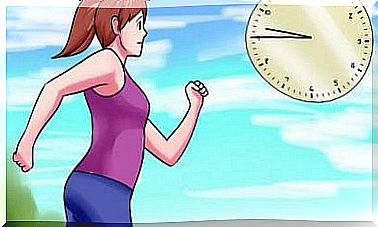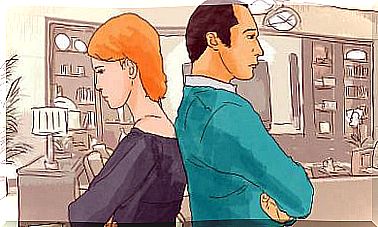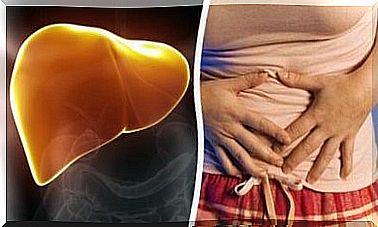Why Does Faintness Occur?
There are several causes that explain why faintness occurs. Some of them are trivial and others require medical attention to disentangle the origin. In this article, we will tell you about it in detail.
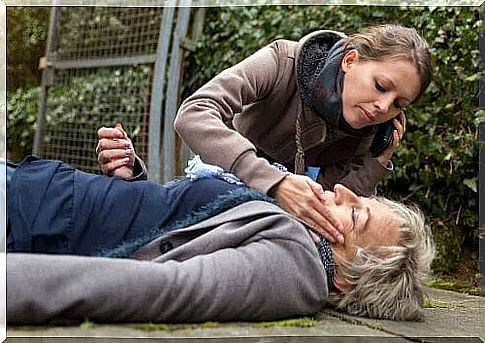
The reasons for faintness are mostly explainable. Some causes are more common and everyday, while others refer to problems with vital organs such as the heart.
We start from the fact that fainting is an event that many of you have experienced at some time. Or, at least you know people close to you who passed out and you found out or witnessed it.
Lipothymia is a word derived from the Greek language. It is made up of two parts: leipo which means to leave , and timos which means meaning . The term refers to loss of consciousness, that is, fainting.
In medicine, this clinical setting is referred to when there is a brief loss of consciousness that results from decreased blood flow to the brain. This minor momentary irrigation can respond to various causes.
The loss of consciousness of faintness is accompanied by loss of muscle tone, which is both a symptom and a defense mechanism. The loss of tone leads to fainting and falls, which keeps the brain at the same level as the rest of the body, helping it to flow.
When falling, the human body makes sure that the heart needs less pressure to get blood to the brain. For this reason, faintness resolves automatically in almost all cases and does so immediately.
We are going to investigate the root causes, but you should be aware that there are some people who are more likely than others to suffer from these outages. The elderly, those taking antihypertensive drugs and heart patients have risk factors .
Symptoms of faintness
When fainting occurs, signs that we quickly identify as fainting appear. Usually there are signs before the fainting itself, then the fall. Among the previous symptoms we can mention:
- Lack of strength : by the loss of muscle tone which is progressive.
- Pallor : especially on the face, since there is less blood flow to the brain, the vascularization of the skin of the face also suffers. The color returns shortly after the fall.
- Sweating : there is usually a cold sweat that anticipates fainting. It comes from a chain reaction of the body trying to raise blood pressure as a last resort. Activating peripheral nerves to prevent fainting collects sweat.
Once fainting is unstoppable, unconsciousness and falls occur. There, the main symptom is the loss of consciousness, the momentary disconnection with reality.
The fall may appear as a secondary sign of a traumatic injury which is thus succinct. These blows are dangerous in the elderly who can even fracture large bones such as the femur, hip or radius and ulna.
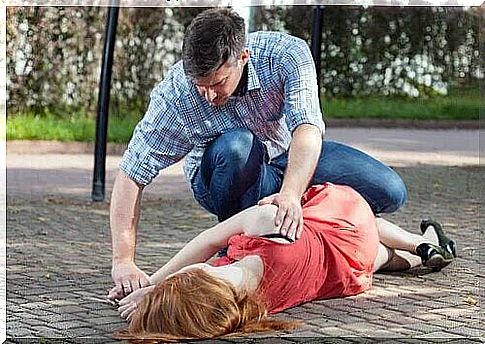
Causes of faintness
In general, lipothymia has a cardiac origin in a small proportion. This is good, as most cases will be mild this way, resulting in other less worrying causes. As general causes of faintness we have:
- Stress : States of anxiety, fear and anxiety can lead to psychogenic fainting.
- Extreme heat : When the body goes into a process of thermal dehydration, its blood pressure drops and this affects the irrigation of the brain.
- Pain : The human body, when in severe pain, may pass out as a defense mechanism to disconnect the brain from pain. In addition, persistent and powerful pain is also likely to cause hypotension.
On the other hand, as more specific causes of fainting, we will mention:
- Arrhythmias : An abnormal heart rhythm is the cause of fainting. This would fall under the category of malignant syncope.
- Anemia : Conditions of severe anemia, with a low concentration of hemoglobin, impair blood circulation and the supply of oxygen to the brain.
- Hypoglycemia : In poorly treated or decompensated diabetics, or in people who have fasted for several hours, there may be a drop in blood sugar. This hypoglycemia causes fainting.

What to do in case of fainting?
Having made it clear that this is a common situation, you should be prepared to act when you witness fainting. You will not perform a diagnosis at this time, but you can give a helping hand to those who need it.
The first thing to do when dealing with an unconscious person is to check that they are breathing and that they have a pulse. If it is a faintness, the person will immediately regain some consciousness and contact with the outside.
Once conscious, you will have to place her horizontally on her back and elevate her lower limbs. This will speed up blood flow to the brain, reversing the symptoms of fainting. It is also helpful to provide warmth with a coat if the skin is cold. In this way, the circulation is also improved.
It would be contraindicated to offer him food or drink instantly. It is best to wait until she recovers more, so that she can sit down and deliberately accept something to feed herself.
If the faintness has lasted a long time, if it is a repetitive event, or if the person has a history of heart disease, a medical consultation is essential. It was perhaps a banal fainting, but the pathologies at risk must be excluded.

